小学英语介词总结附练习
小学常用介词讲解及练习

小学英语总复习小学英语介词总结介词(Preposition )一、概述介词是英语中很活跃的词,一般置于名词之前。
它常和名词或名词性词语构成介词短语。
同一个介词常和不同的词语搭配形成固定搭配,表示不同意义。
1、小学英语介词at,in与on表示时间时的用法in; on; at用在时间词前,表"在”at表示时间的一点;in表示一个时期;on表示特殊日子。
如:He goes to school at seven o ' clock in the mornin他早晨七点上学。
Can you fin ish the work in two days. 你能在两天内完成这个工作吗?Linda was born on the sec ond of May. 琳达五月二日出生。
1). at + 具体时刻,I go to school at 8 o'lock.At后常接几点几分,天明,中午,日出,日落,开始等。
如:at five o ' clo(五点),at dow n (黎明),at daybreak (天亮),at sun rise (日出),at noon (中午),at sun set (日落),at midni ght (半夜),at the beg inning of the month(月初),at that time (那时),at that mome nt (那会儿),at this time of day (在一天的这个时候)。
2). in +年、月、季节及一天中的上午、下午、晚上。
in 2006 (2006 年),in May , 2004 (2004 年五月),in the morning (早晨/上午),inthe after noon (下午),in the evening (晚上),in the ni ght (夜晚),in the daytime(白天),in the 21st century (21 世纪),in three days (weeks/month )三天(周/个月),in a week (一周),in spri ng (春季)。
小学介词练习题及答案
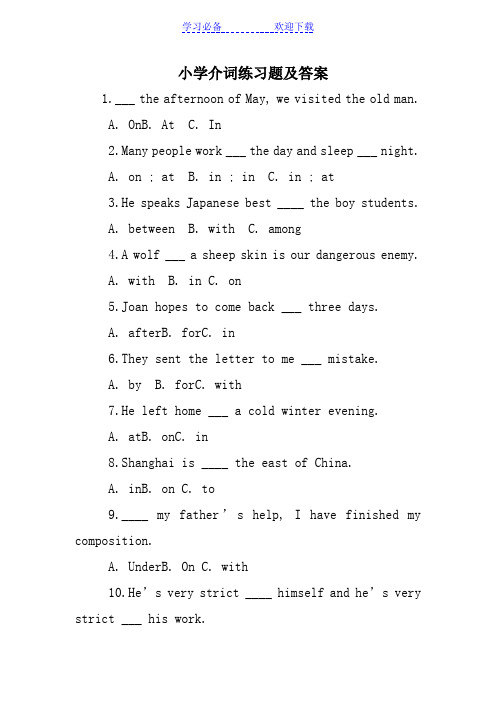
小学介词练习题及答案1.___ the afternoon of May, we visited the old man.A. OnB. AtC. In2.Many people work ___ the day and sleep ___ night.A. on ; atB. in ; inC. in ; at3.He speaks Japanese best ____ the boy students.A. betweenB. withC. among4.A wolf ___ a sheep skin is our dangerous enemy.A. withB. inC. on5.Joan hopes to come back ___ three days.A. afterB. forC. in6.They sent the letter to me ___ mistake.A. byB. forC. with7.He left home ___ a cold winter evening.A. atB. onC. in8.Shanghai is ____ the east of China.A. inB. onC. to9.____ my father’s help, I have finished my composition.A. UnderB. OnC. with10.He’s very strict ____ himself and he’s very strict ___ his work.A. with ; inB. in ; withC. with ; with11.I really can’t agree ____ you.A. toB. onC. with12.The shop won’t open ___ nine in the morning.A. untilB. atC. during13.How about ___ the flowers now?A. wateringB. are wateringC. watered14.She spent all his money ___ books.A. inB. withC. on15.They are talking ___ low voices.A. withB. inC. on16.It’s very kind ___ you to help us.A. forB. toC. of17.What will you have ___ breakfast this morning?A. withB. forC. by18.A plane is flying ____ the city.A. onB. overC. above19.You are free to speak ___ the meeting.A. atB. inC. on20.Mr. Green will stay in China___ Friday.A. toB. onC. till21.It’s wrong to play jokes ___ other people.A. onB. ofC. with22.Which color do you like? I prefer blue ___ red.A. forB. asC. to23.The student will give us a talk ___ how to use our spare time.A. forB. onC. in24.I paid two hundred yuan ___ that kind of bicycle.A. inB. forC. on25.The doctor is very kind ___ his patientsA. toB. onC. at26.We can’t live ___ air.A. inB. withC. without27.The child was afraid___ the strange sound.A. atB. forC. of28.He was very angry ___ her for being late.A. forB. withC. at29.What do you think __ _ the play?A. aboutB. likeC. of30.I think it’s the right way to work out the problem, but I am notsure _____ it.A. doB. aboutC. of31.Reading ___ the sun isn’t good ___ youA. under ; forB. in ; forC. in ; to32.I won’t ask about it, I’m going to see it ___ _ my own eyes.A. byB. forC. with33.We go to school every day _ ___ Sunday.A. exceptB. withoutC. on34.There is a small river ___ the two townsA. inB. betweenC. among35.Li Lei sometimes falls asleep ___ the lesson.A. forB. throughC. during36.Mr. Black went to Paris ___ a few days.A. forB. inC. after37.They will leave ________ London next month.A. toB. fromC. for38.Are you going to the zoo __ _ bus or ___ my car?A. on ; byB. by ; inC. on ; in39.He woke up several times _ __ the nightA. inB. atC. on40. We traveled overnight to Paris and arrived _______ o’clock ______the morning.A. on; inB. at; inC. at; onD. in; on41. Where’s Lily? We are all here _______ her.A. besideB. aboutC. exceptD. with42. She sent her friend a postcard _______ a birthday present.A. onB. asC. forD.43. Jack has studied Chinese in this school ______ the year of000.A. sinceB. inC. onD. by44. ---What is a writing brush, do you know?---It’s _______ writing and drawing.A. withB. toC. forD. by45. English is widely used ______ travellers and business people all over the world.A. toB. forC. asD. by46. _____ the help of my teacher, I caught up with the other students.A. UnderB. InC. WithD. On47. Hong Kong is ______ the south of China, and Macao is ______the west of Hong Kong.A. in; toB. to; toC. to; inD. in; in48. ---You’d better not go out now. It’s raining.介词是小学英语考试的重点之一,为了让大家能够更好的掌握英语介词,大家练习一下!介词填空1\ the first day ________ school\ ________ the school playground3\ _________ classes\ _________ Wednesday5\ __________ a farm\ pull _________ carrots7\ a lot _______ fruit trees\ live _________ a town 9\ ________ the weekends12\ look _______ them 10\ _________ the sitting room 11\ ________ theth ______ November13\ _________ the playground 14\ _______ the school hall15\ ________ New Year16\ talk _______ his students _______ holidays17\ _________ Christmas Day18\ have a big lunch _________ my family19\ dress _______ _________ costumes24\ __________ Mum and Dad.20\ _________ September or October1\ ________ hisgrandpa’s house介词练习1.___ the afternoon of May, we visited the old man.A. OnB. AtC. In2.Many people work ___ the day and sleep ___ night.A. on ; atB. in ; inC. in ; at3.He speaks Japanese best ____ the boy students.A. betweenB. withC. among4.A wolf ___ a sheep skin is our dangerous enemy.A. withB. inC. on 5.Joan hopes to come back ___ three days. A. after B. for C. in 6.They sent the letter to me ___ mistake.A. byB. forC. with7.He left home ___ a cold winter evening.A. atB. onC. in8.Shanghai is ____ the east of China.A. inB. onC. to9.____ my father’s help, I have finished my composition.A. UnderB. OnC. with10.He’s very strict ____ himself and he’s very strict ___ his work.A. with ; inB. in ; withC. with ; with11.I really can’t agree ____ you.A. toB. onC. with12.The shop won’t open ___ nine in the morning.A. untilB. atC. during13.How about ___ the flowers now?A. wateringB. are wateringC. watered14.She spent all his money ___ books.A. inB. withC. on15.They are talking ___ low voices.A. withB. inC. on16.It’s very kind ___ you to help us. A. for B. to C. of 17.What will you have ___ breakfast this morning? A. with B. for C. by18.A plane is flying ____ the city.A. onB. overC. above19.You are free to speak ___ the meeting.A. atB. inC. on20.Mr. Green will stay in China___ Friday.A. toB. onC. till21.It’s wrong to play jokes ___ other people.A. onB. ofC. with22.Which color do you like? I prefer blue ___ red.A. forB. asC. to23.The student will give us a talk ___ how to use our spare time.A. forB. onC. in24.I paid two hundred yuan ___ that kind of bicycle.A. inB. forC. on25.The doctor is very kind ___ his patientsA. toB. onC. at26.We can’t live ___ air. A. in B. with C. without27.The child was afraid ___ the strange sound. A. atB. forC. of28.He was very angry ___ her for being late.A. forB. withC. at29.What do you think __ _ the play?A. aboutB. likeC. of30.I think it’s the right way to work out the problem, but I am notsure _____ it.A. doB. aboutC. of31.Reading ___ the sun isn’t good _ __ youA. under ; forB. in ; forC. in ; to32.I won’t ask about it, I’m going to see it ___ _ my own eyes.A. byB. forC. with33.We go to school every day _ ___ Sunday.A. exceptB. withoutC. on34.There is a small river ___ the two townsA. inB. betweenC. among35.Li Lei sometimes falls asleep ___ the lesson.A. forB. throughC. during36.Mr. Black went to Paris ___ a few days.A. forB. inC. after37.They will leave ________ London next month.A. toB. fromC. for38.Are you going to the zoo __ _ bus or ___ my car?A. on ; byB. by ; inC. on ; in39.He woke up several times _ __ the nightA. inB. atC. on40. We traveled overnight to Paris and arrived _______ o’clock ______ the morning.A. on; inB. at; inC. at; onD. in; on41. Where’s Lily? We are all here _______ her.A. besideB. aboutC. exceptD. with42. She sent her friend a postcard _______ a birthday present.A. onB. asC. forD.43. Jack has studied Chinese in this school ______ the year of000.A. sinceB. inC. onD. by44. ---What is a writing brush, do you know?---It’s _______ writing and drawing.A. withB. toC. forD. by45. English is widely used ______ travellers and business people all over the world.A. toB. forC. asD. by46. _____ the help of my teacher, I caught up with the other students.A. UnderB. InC. WithD. On47. Hong Kong is ______ the south of China, and Macao is ______the west of Hong Kong.A. in; toB. to; toC. to; inD. in; in48. ---You’d better not go out now. It’s raining.---It doesn’t matter. My new coat can keep ______ rain.A. inB. ofC. withD. off49.There are many apples ___ the tree. A bird ___ the tree is picking an apple.A. in ; onB. on ; inC. in ; at50. “Who are you going to play ____?” “Grade Two.”A. aboutB. byC. against圈出下列句子中运用不恰当的介词,将正确的答案写在横线上。
小学英语《常见介词及其应用》练习
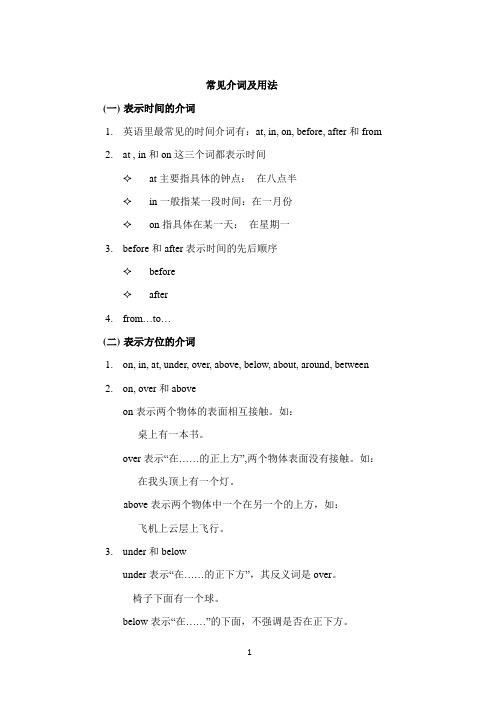
常见介词及用法(一)表示时间的介词1.英语里最常见的时间介词有:at, in, on, before, after和from2.at , in和on这三个词都表示时间✧at主要指具体的钟点:在八点半✧in一般指某一段时间:在一月份✧on指具体在某一天:在星期一3.before和after表示时间的先后顺序✧before✧after4.from…to…(二)表示方位的介词1.on, in, at, under, over, above, below, about, around, between2.on, over和aboveon表示两个物体的表面相互接触。
如:桌上有一本书。
over表示“在……的正上方”,两个物体表面没有接触。
如:在我头顶上有一个灯。
above表示两个物体中一个在另一个的上方,如:飞机上云层上飞行。
3.under和belowunder表示“在……的正下方”,其反义词是over。
椅子下面有一个球。
below表示“在……”的下面,不强调是否在正下方。
他们家的房子在我家的下面。
4.in表示位置“在……里面”,也可以用来表示在一个很大的空间内。
孩子们正在房间里玩。
书都在我的书包里。
5.at表示“在……旁边”。
老师正在桌边。
6.around表示“在……周围”。
There are lots of flowers around the house. 房子周围有许多花。
7.behind表示“在……的后面”。
别躲在树后。
8.in front of表示“在……的前面”。
9.between表示“在两者之间”。
(三)表示动向的介词。
1.常见的动向介词有:into, out of, up, down, from, to, through, along等。
2.into和out ofinto,out of简跳进了水里。
3.up和down:他经常爬山。
(四)表示方式的介词常见的表示方式的介词有:by, with, in等。
小学英语总复习--常用介词介绍及专项练习
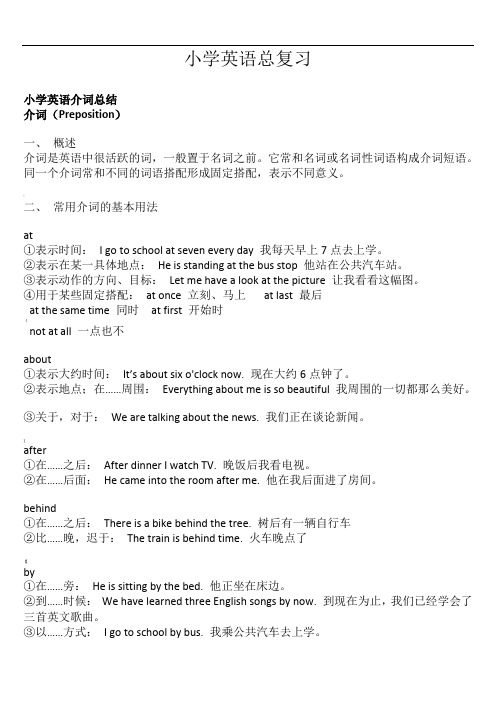
小学英语总复习小学英语介词总结介词(Preposition)一、概述介词是英语中很活跃的词,一般置于名词之前。
它常和名词或名词性词语构成介词短语。
同一个介词常和不同的词语搭配形成固定搭配,表示不同意义。
'二、常用介词的基本用法at①表示时间:I go to school at seven every day 我每天早上7点去上学。
②表示在某一具体地点:He is standing at the bus stop 他站在公共汽车站。
③表示动作的方向、目标:Let me have a look at the picture 让我看看这幅图。
④用于某些固定搭配:at once 立刻、马上at last 最后at the same time 同时at first 开始时《not at all 一点也不about①表示大约时间:It’s about six o'clock now. 现在大约6点钟了。
②表示地点;在……周围:Everything about me is so beautiful 我周围的一切都那么美好。
③关于,对于:We are talking about the news. 我们正在谈论新闻。
]after①在……之后:After dinner I watch TV. 晚饭后我看电视。
②在……后面:He came into the room after me. 他在我后面进了房间。
behind①在……之后:There is a bike behind the tree. 树后有一辆自行车②比……晚,迟于:The train is behind time. 火车晚点了【by①在……旁:He is sitting by the bed. 他正坐在床边。
②到……时候:We have learned three English songs by now. 到现在为止,我们已经学会了三首英文歌曲。
小学英语常用介词用法详解及练习

小学英语常用介词用法详解及练习介词在句子中表示名词或代词等与其他词之间的关系。
不能单独作句子成分,常位于名词或代词(或与之相当的他词类、短语、从句)前面构成介词短语。
介词后面的成分作介词的宾语。
介词,是表示两词之间的关系的词。
我们在小学英语中学习的英语介词有:一、时间介词• 1.on( 1 ) 在------上面 The book is on the desk.( 2 ) 在------(哪一天/星期)What do you do on Wednesday?( 3 ) 在------(月、日)My birthday is on August 2nd.• 2.in(1)在------里面 The pens are in the pencil-box.(2)在------(哪一年/月)His birthday is in October. He wor ked here in 1992.(3)在------(地方) He works in Dongguan.•(4)在------之内 What are you going to do in 20 years?•(5)在------(早上、下午、晚上)I do morning exercises in the morning every day.I usually play basketball in the afternoon.I often do my homework in the evening.• 3.at(1)在------(点钟)I usually go to school at 8:00 am.(2)在中午 at noon二、方位介词• 1. under 在------底下 There is a ball under the bed.• 2. near 在------附近 There is a book shop near ourschool.• 3. in front of在------前面A boy is standing in front of the house.• 4. beside 在------旁边 A football is beside thedoor.• 5. next to 紧挨着 There is a bus station next to No. 13 Middle School.• 6. over 在------正上方 A bridge is over the river.•7. on the left在------左边 The bookstore is on the left.•8. on the right在------右边The hospital is on the right.•9. before在……之前 Mike sits before me.•10. after在------以后 He went home after school.•11. in the middle在------中间The road is in the middle.•12. at(1)在------(小地方) I am at school today.I was at home yesterday.(2)看一看 Look at the blackboard.•13. behind 在------后面There is a broom behind the door.。
小学英语语法介词to和of与for的用法及练习含答案

小学英语语法介词to,of与for的用法To、of与for是三个极易混用的介词,在具体使用时应从以下三个方面来掌握:一、表示“……的”含义时,应根据不同的关系选用不同的介词。
1.若表示“所有,所属”关系时,用介词of。
如: the life ofthe people 人民的生活the roofof the house 屋顶2.若表示“解释,说明”关系时,用介词for。
如: the money for the shoes 鞋钱the shop for clothes 成衣店3.若表示“解答,用途”关系时,用介词to。
如:the key to the exercise 练习的答案the way to the hospital(到)医院的路二、在含有双宾语的句子中,当间接宾语(指人的宾语)置于直接宾语(指物的宾语)之后时,间接宾语之前须加上介词to或for。
1.当及物动词是give,pass,tell,teach,ask,show 等必须有双宾语意义才完整的句子中,若将间接宾语放在直接宾语之后,用介词to 连接。
如:Miss Cao teaches English to us. 曹老师教我们英语。
Please pass a cup oftea to me.请给我一杯茶。
2.当及物动词是make,buy,fetch,get,play,find 等只需一个宾语就能表达一个完整意义的句子中,若将间接宾语放在直接宾语后面时,用介词for 连接。
如:Her uncle bought a new bike for her.她叔叔给她买了一辆新自行车。
Mother cooks breakfast for us every day.妈妈每天为我们做早饭三、当不定式短语作主语,谓语是系表结构(即“It+be+形容词+不定式”句型)时,若不定式动词需要逻辑主语时,其引导词可以是of也可以是for。
二者的选择主要取决于该句型中的形容词。
完整版)小学英语介词专项练习及答案
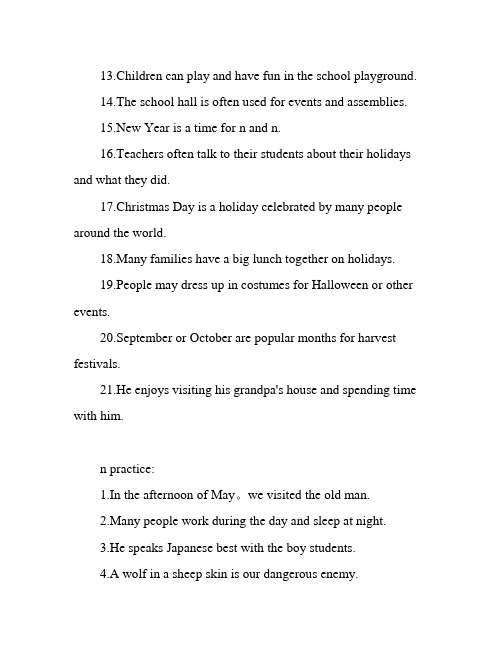
完整版)小学英语介词专项练习及答案1.On the first day of school。
students are always excited and nervous.2.During recess。
students can play in the school playground.3.Different classes have different subjects and teachers.4.Wednesday is often referred to as "hump day" because it's in the middle of the week.5.Visiting a farm can be a fun and nal experience.6.Children can pull carrots from the ground and learn about where their food comes from.7.There are often a lot of fruit trees on farms.8.Some people prefer to live in a town rather than a city or rural area.9.On the weekends。
people can relax and spend time with their families.10.The sitting room is a comfortable place to relax and watch TV.11.On the 4th of November。
some countries celebrate a holiday called "Thanksgiving."13.Children can play and have fun in the school playground.14.The school hall is often used for events and assemblies.15.New Year is a time for n and n.16.Teachers often talk to their students about their holidays and what they did.17.Christmas Day is a holiday celebrated by many people around the world.18.Many families have a big lunch together on holidays.19.People may dress up in costumes for Halloween or other events.20.September or October are popular months for harvest festivals.21.He enjoys visiting his grandpa's house and spending time with him.n practice:1.In the afternoon of May。
小学英语方位介词(含练习题)
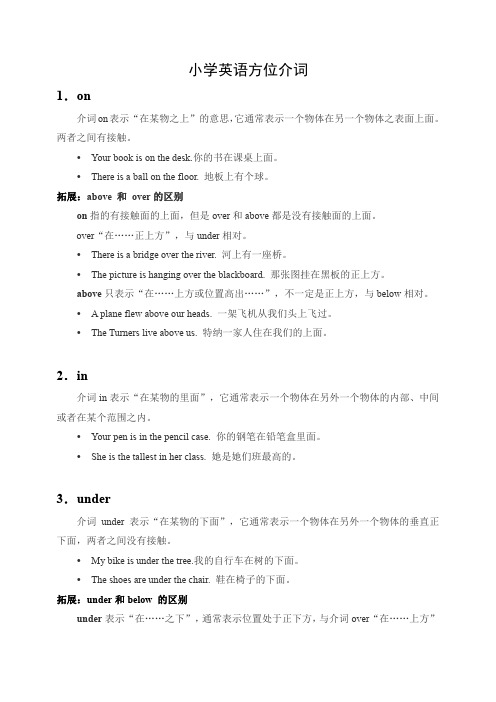
小学英语方位介词1.on介词on表示“在某物之上”的意思,它通常表示一个物体在另一个物体之表面上面。
两者之间有接触。
•Your book is on the desk.你的书在课桌上面。
•There is a ball on the floor. 地板上有个球。
拓展:above 和over的区别on指的有接触面的上面,但是over和above都是没有接触面的上面。
over“在……正上方”,与under相对。
•There is a bridge over the river. 河上有一座桥。
•The picture is hanging over the blackboard. 那张图挂在黑板的正上方。
above只表示“在……上方或位置高出……”,不一定是正上方,与below相对。
• A plane flew above our heads. 一架飞机从我们头上飞过。
•The Turners live above us. 特纳一家人住在我们的上面。
2.in介词in表示“在某物的里面”,它通常表示一个物体在另外一个物体的内部、中间或者在某个范围之内。
•Your pen is in the pencil case. 你的钢笔在铅笔盒里面。
•She is the tallest in her class. 她是她们班最高的。
3.under介词under表示“在某物的下面”,它通常表示一个物体在另外一个物体的垂直正下面,两者之间没有接触。
•My bike is under the tree.我的自行车在树的下面。
•The shoes are under the chair. 鞋在椅子的下面。
拓展:under和below 的区别under表示“在……之下”,通常表示位置处于正下方,与介词over“在……上方”相对应。
•There is a book under the table.桌子下面有一本书。
• A cat is sitting under the table.一只猫在桌子下面。
小学英语介词整理(循序渐进地讲解和练习)
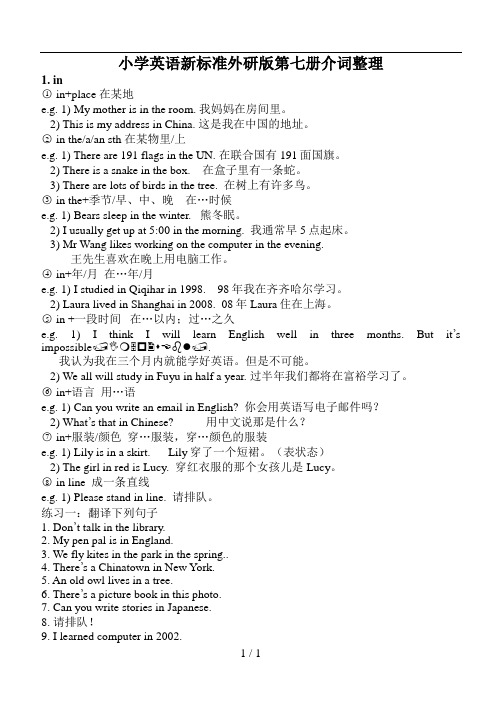
小学英语新标准外研版第七册介词整理1. in○1 in+place 在某地e.g. 1) My mother is in the room. 我妈妈在房间里。
2) This is my address in China. 这是我在中国的地址。
○2 in the/a/an sth 在某物里/上e.g. 1) There are 191 flags in the UN. 在联合国有191面国旗。
2) There is a snake in the box. 在盒子里有一条蛇。
3) There are lots of birds in the tree. 在树上有许多鸟。
○3 in the+季节/早、中、晚在…时候e.g. 1) Bears sleep in the winter. 熊冬眠。
2) I usually get up at 5:00 in the morning. 我通常早5点起床。
3) Mr Wang likes working on the computer in the evening.王先生喜欢在晚上用电脑工作。
○4 in+年/月在…年/月e.g. 1) I studied in Qiqihar in 1998. 98年我在齐齐哈尔学习。
2) Laura lived in Shanghai in 2008. 08年Laura住在上海。
○5 in +一段时间在…以内;过…之久e.g. 1) I think I will learn English well in three months. But it’s impossible .我认为我在三个月内就能学好英语。
但是不可能。
2) We all will study in Fuyu in half a year. 过半年我们都将在富裕学习了。
○6 in+语言用…语e.g. 1) Can you write an email in English? 你会用英语写电子邮件吗?2) What’s that in Chinese? 用中文说那是什么?○7 in+服装/颜色穿…服装,穿…颜色的服装e.g. 1) Lily is in a skirt. Lily穿了一个短裙。
【优质讲义】小学英语语法归纳训练讲义-12 介词in,on,at 全国通用版(含答案)

语法——介词in on atPart 1:学问点一、介词:是一种虚词,在句子中表示名词或代词与其他词之间的关系,不能单独做为句子成分,常位于名词或代词前面构成介词短语。
二、具体用法:常用介词1.in(1)表示方位:在……里面例句:There are three books in my bag.我书包里有三本书。
(2)表示地点:A.表示在大地方例句:I live in Hangzhou.我住在杭州。
B.表示属于该范围例句:Hei Longji ang lies in the north of China.黑龙江在中国北部。
(3)表示时间:A.表示一段时间(比较长)例:in summer在夏天in 2021在2021年in February 在二月B.表示在早上、下午、晚上例:in the morning/afternoon/evening(4)表示使用某种材料、语言等:例句:I can sing the song in English.我能用英语唱这首歌。
2.on(1)表示地点:在……上面例句:There is an apple on the desk.桌子上有一本书。
(2)表示时间:A.表示在具体某一天的上午、下午或晚上例:on June thirteenth在六月13日on the morning of May 1st在五月一日的早上B.表示在星期几的上午、下午或晚上例:on Friday在周五on Saturday afternoon在周六的下午2.at(1)表示在小地点:例:at school /home(2)表示时间点:例:at seven在七点at night在夜晚Part 2:练习一、用介词填空。
1.My mother begins to work ______ 8:00 ______ t he morning.2.Do you stay ______ home ______ weekend?3.They live ______ a new house now.4.Xinjiang is ______ the west of China.5.Lily usually have breakfast ______ the morning.6.They often have lunch ______ half past twelve.7.What’s this ______ English?8.There is a big gym ______ my school.9.She came to this city ______ 2020.10.It often snows here ______ winter.11.I will be back ______ a month.12.Don’t watch TV too much ______ the evening.13.Sally was born ______ May 11th.14.We don’t go to school ______ Saturday and S unday.15.They were happy ______ that time.16.______ the age of ten, I began to learn English.17.What do you often do ______ noon?18.______ a cold winter morning, I met her in the street.19.Mrs. Green came to Beijing ______ 2005.20.Children wake up very early ______ the morning ofChristmas Day.答案:1.at in2.at on3.in4.in5.in6.at7.in8.in9.in 10.i n 11.in 12.in 13.on 14.on 15.at 16.At 17.at 18.On 19.in 20.on。
小学六年级英语介词知识点及练习题
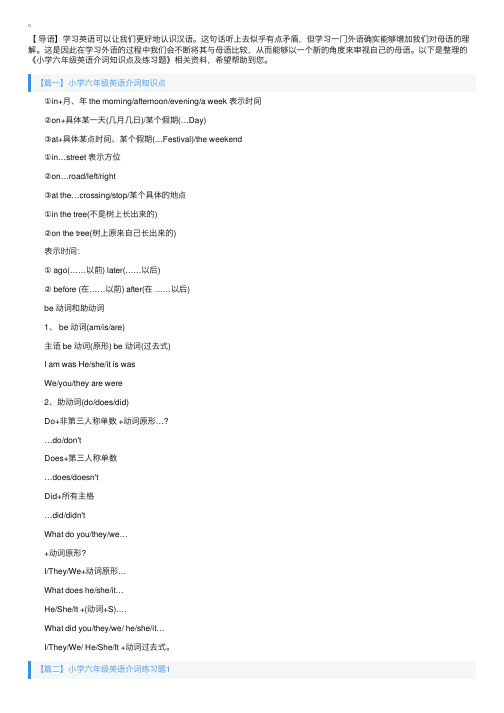
【导语】学习英语可以让我们更好地认识汉语。
这句话听上去似乎有点⽭盾,但学习⼀门外语确实能够增加我们对母语的理解。
这是因此在学习外语的过程中我们会不断将其与母语⽐较,从⽽能够以⼀个新的⾓度来审视⾃⼰的母语。
以下是整理的《⼩学六年级英语介词知识点及练习题》相关资料,希望帮助到您。
【篇⼀】⼩学六年级英语介词知识点 ①in+⽉、年 the morning/afternoon/evening/a week 表⽰时间 ②on+具体某⼀天(⼏⽉⼏⽇)/某个假期(…Day) ③at+具体某点时间、某个假期(…Festival)/the weekend ①in…street 表⽰⽅位 ②on…road/left/right ③at the…crossing/stop/某个具体的地点 ①in the tree(不是树上长出来的) ②on the tree(树上原来⾃⼰长出来的) 表⽰时间: ① ago(……以前) later(……以后) ② before (在……以前) after(在 ……以后) be 动词和助动词 1、 be 动词(am/is/are) 主语 be 动词(原形) be 动词(过去式) I am was He/she/it is was We/you/they are were 2、助动词(do/does/did) Do+⾮第三⼈称单数 +动词原形…? …do/don't Does+第三⼈称单数 …does/doesn't Did+所有主格 …did/didn't What do you/they/we… +动词原形? I/They/We+动词原形… What does he/she/it… He/She/It +(动词+S)…. What did you/they/we/ he/she/it… I/They/We/ He/She/It +动词过去式。
【篇⼆】⼩学六年级英语介词练习题1 ( ) 1. Why did you get up so early ___ this morning.A. onB. /C. atD. in ( ) 2. He went to Shanghai___ September 3, 1991 and came back___ a cold morning last year.A. in; onB. on; inC. on; onD. in; ia ( ) 3. Lucy was born____ the night of May 12, 1984.A. onB. inC. atD. to ( ) 4. Mrs Brown came to China ____ 1996.A.onB. ofC. toD. in ( ) 5 ___ the morning of November 20, 1915, the workers came to Chicago to show their mourning of Joe Hill.A. OnB. InC. OnD. At ( ) 6. Ann moved___Hangzhou___September, 1992.A. /; inB. to; inC. to; on D, in; in ( ) 7. They started off___an autumn afternoon.A. duringB. atC. inD. on ( ) 8. He often goes ____ school ____ six thirty ____ the morning.A. for; to; inB. to; at; inC. to; for; at D, for; at; to ( ) 9. He arrived ___ Shanghai ___ 9: 30 ___ March 5.A. at; in; atB. to; on; atC. in; on; atD. in; at; on ( ) 10.The English teacher told me to get there____ half past ten.A. inB. atC. onD. of 参考答案: B C A D B A D B D B【篇三】⼩学六年级英语介词练习题2 ( ) 1. Children get gifts ____ Christmas and ____ their birthdays.A. on; onB. at; onC. in; inD. in; on ( ) 2.----There is nothing ____tomorrow afternoon, is there? -----No. We can have a game of table tennis.A. onB. inC. outD. up ( ) 3. A lot of students in our school were born____March, 1981.A. inB. atC. onD. since ( ) 4. He suddenly returned____ a rainy night.A. onB. atC. inD. during ( ) 5. My grandfather was born____Oct. 10, 1935.A. onB. inC. atD. of ( ) 6. The train is starting___five minutes.A. inB. atC. forD.still ( ) 7. Mike does his exercises ____ seven _____ the evening.A. on; toB. at; inC. by; ofD. at; on ( ) 8. Children wake up very early____the morning of Christmas Day.A. inB. onC. forD. at ( ) 9 ____ a cold winter morning, I met her in the stfeet.A. InB. OnC. AtD. For ( ) 10 It happened to be very cold____ the morning of our sports meeting.A. atB. onC. withD. of 参考答案:B A A A A A B B B B。
小学英语语法——介词知识点讲解+练习
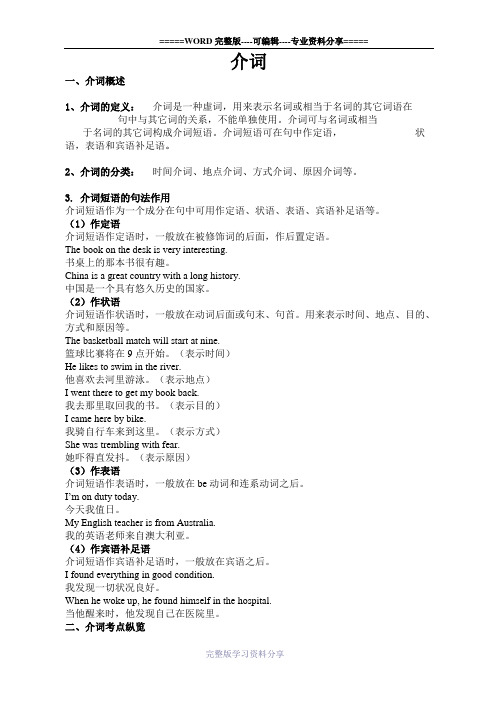
介词一、介词概述1、介词的定义:介词是一种虚词,用来表示名词或相当于名词的其它词语在句中与其它词的关系,不能单独使用。
介词可与名词或相当于名词的其它词构成介词短语。
介词短语可在句中作定语,状语,表语和宾语补足语。
2、介词的分类:时间介词、地点介词、方式介词、原因介词等。
3. 介词短语的句法作用介词短语作为一个成分在句中可用作定语、状语、表语、宾语补足语等。
(1)作定语介词短语作定语时,一般放在被修饰词的后面,作后置定语。
The book on the desk is very interesting.书桌上的那本书很有趣。
China is a great country with a long history.中国是一个具有悠久历史的国家。
(2)作状语介词短语作状语时,一般放在动词后面或句末、句首。
用来表示时间、地点、目的、方式和原因等。
The basketball match will start at nine.篮球比赛将在9点开始。
(表示时间)He likes to swim in the river.他喜欢去河里游泳。
(表示地点)I went there to get my book back.我去那里取回我的书。
(表示目的)I came here by bike.我骑自行车来到这里。
(表示方式)She was trembling with fear.她吓得直发抖。
(表示原因)(3)作表语介词短语作表语时,一般放在be动词和连系动词之后。
I’m on duty today.今天我值日。
My English teacher is from Australia.我的英语老师来自澳大利亚。
(4)作宾语补足语介词短语作宾语补足语时,一般放在宾语之后。
I found everything in good condition.我发现一切状况良好。
When he woke up, he found himself in the hospital.当他醒来时,他发现自己在医院里。
小学英语语法归纳训练讲义-13方位介词全国通用版(含答案)

语法——方位介词Part 1:知识点1.in在……里面例句:There are many apples in the basket.篮子里有许多苹果。
2.on在……上面(有接触)例句:There is a book on the desk.桌子上有一本书。
3.over在……上面(不接触)例句:There is a bridge on the river.河上有座桥。
4.under在……下面例句:There is a ball under the chair.椅子下面有一个球。
5.before在……之前例句:Micky stands before Joe.Micky站在Joe前面。
6.behind在……后面例句:There is a tree behind the house.房子后面有一棵树。
7.beside在……旁边例句:A cat is beside the TV.电视旁边有一只猫。
8.near在……附近例句:There is a zoo neat the park.公园旁边有一个动物园。
9.next to紧挨着例句:The library is next to the gym.图书馆紧挨着体育馆。
10.i n front of在……前面例句:There is a car in front of the house.房前有一辆车。
【拓展】in the front of(在内部靠前的位置)例句:The teacher is standing in the front of the classroom.教师站在教室的前面。
11.i n the middle of在……中间例句:There is a lake in the middle of the zoo.动物园中间有一个湖。
【拓展】between在两者之间,常与and连用例句:There is a bridge between the two village.在两个村子中间有一座桥。
小学语法:介词专项练习及答案
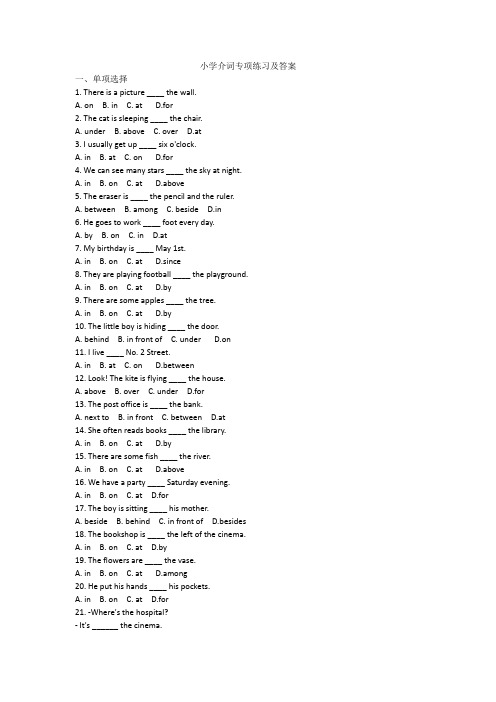
小学介词专项练习及答案一、单项选择1.There is a picture ____ the wall.A. onB. inC. atD.for2.The cat is sleeping ____ the chair.A. underB. aboveC. overD.at3.I usually get up ____ six o'clock.A. inB. atC. onD.for4.We can see many stars ____ the sky at night.A. inB. onC. atD.above5.The eraser is ____ the pencil and the ruler.A. betweenB. amongC. besideD.in6.He goes to work ____ foot every day.A. byB. onC. inD.at7.My birthday is ____ May 1st.A. inB. onC. atD.since8.They are playing football ____ the playground.A. inB. onC. atD.by9.There are some apples ____ the tree.A. inB. onC. atD.by10.The little boy is hiding ____ the door.A. behindB. in front ofC. underD.on11.I live ____ No. 2 Street.A. inB. atC. onD.between12.Look! The kite is flying ____ the house.A. aboveB. overC. underD.for13.The post office is ____ the bank.A. next toB. in frontC. betweenD.at14.She often reads books ____ the library.A. inB. onC. atD.by15.There are some fish ____ the river.A. inB. onC. atD.above16.We have a party ____ Saturday evening.A. inB. onC. atD.for17.The boy is sitting ____ his mother.A. besideB. behindC. in front ofD.besides18.The bookshop is ____ the left of the cinema.A. inB. onC. atD.by19.The flowers are ____ the vase.A. inB. onC. atD.among20.He put his hands ____ his pockets.A. inB. onC. atD.for21.-Where's the hospital?- It's ______ the cinema.A. nextB. next toC. near toD.in22.I'm taller than you, so I can stand ______ you in the photo.A. behindB. in front ofC. besideD.besides23.There are some apples ______ the plate.A. inB. onC. atD.under24.He arrived ______ Beijing ______ a cold morning.A. in; onB. at; inC. in; inD.at;on25.The boy is looking ______ the window and watching the cars on the street.A. out ofB. afterC. forD.at26.We usually have a party ______ New Year's Eve.A. inB. onC. atD.for27.My schoolbag is different ______ yours.A. fromB. withC. asD.in- 28.How do you usually go to school?- I usually go to school ______ bike.A. onB. byC. inD.for29.She's wearing a beautiful dress ______ red.A. inB. onC. withD.at30.There's a small river ______ the two villages.A. betweenB. amongC. acrossD.at31.The train will leave ______ five minutes.A. inB. afterC. forD.at32.I met an old friend of mine ______ my way to school.A. inB. onC. atD.by- 33.Can you see the hole ______ the wall?- Yes, I can.A. inB. onC. atD.into34.He is very kind ______ his students.A. toB. ofC. forD.with35.She is interested _______ learning new languages.A.inB. atC. onD. for36.The book you're looking _______ is on the table.A. inB. outC. forD. after37.They will arrive _______ Beijing next Monday.A. inB. atC. onD. for38.He is good _______ playing soccer.A. inB. atC. onD. for39.We usually have lunch _______ 12:00 PM.A. inB. atC. onD. for40.She is afraid _______ making mistakes.A. inB. atC. ofD. for41.He is busy _______ his homework now.A. inB. atC. withD. on42.She is proud _______ her achievements.A. inB. atC. ofD. for43.We are preparing for the exam _______ advance.A. inB. atC. onD. for44. _____the afternoon of May, we visited the old man.A. OnB. AtC. InD.With45. Many people work __ the day and sleep __ night.A. on ; atB. in ; inC. in ; atD.on;on46. He speaks Japanese best ____ the boy students.A. betweenB. withC. amongD.in47. A wolf __ a sheep skin is our dangerous enemy.A. withB. inC. onD.under48. Joan hopes to come back __ three days.A. afterB. forC. inD.on49. They sent the letter to me __ mistake.A. byB. forC. withD.on50. He left home __ a cold winter evening.A. atB. onC. inD.with51. Shanghai is ____ the east of China.A. inB. onC. toD.by52. ____ my father’s help, I have finished my composition.A. UnderB. OnC. withD.In53. He’s very strict ____ himself and he’s very strict ___ his work.A. with ; inB. in ; withC. with ; withD.at;with54. I really can’t agree ____ you.A. toB. onC. withD.for55. The shop won’t open ___ nine in the morning.A. untilB. atC. duringD.in56. She spent all her money ___ books.A. inB. withC. onD.by57. They are talking ___ low voices.A. withB. inC. onD.for二、用适当的介词填空1.The ball is ____ the box.2.There is a map of China ____ the wall.3.I go to school ____ seven thirty.4.The boy is standing ____ the two girls.5.We can see a lot of snow ____ winter.6.My mother goes to work ____ bus.7.The dog is running ____ the yard.8.I have lunch ____ home.9.The pen is ____ the book and the notebook.10.They are having a party ____ the park.11.The sun shines brightly ____ the sky.12.There are some birds singing ____ the tree.13.I put my clothes ____ the wardrobe.14.She is waiting for you ____ the bus stop.15.The plane is flying ____ the clouds.16.The supermarket is ____ the cinema and the hospital.17.We usually play games ____ class.18.There are some desks and chairs ____ the classroom.19.The moon is high ____ the sky at night.20.I like to swim ____ the pool.21.I usually get up ___ six o'clock in the morning.22.My birthday is ___ July.23We have a party ___ Christmas Day.24The book is ___ the table.25.The cat is hiding ___ the bed.26.There is a tree ___ the house.27.She goes to school ___ bike every day.28.I'm interested ___ playing football.29.He is good ___ English.30.The train will leave ___ five minutes.31.She has been living in this city ___ 2010.32.They talked ___ a low voice so as not to wake the baby up.三、选择合适的介词填空1.Look! There is a bird (in/on) the tree.2.My sister's birthday is (at/on) March 12th.3.I often play football (in/on) Sunday afternoon.4.The children are playing games (beside/besides) the lake.5.He put his pen (into/onto) the pencil - box.6.She is good (at/for) English.7.They went to the park (by/on) foot.8.We should listen (to/at) the teacher.9.I usually go to school ___ 7:30 in the morning. (at / on / in)10.My birthday is ___ May. (at / on / in)11.She likes reading books ___ night. (at / on / in)12.The cat is ___ the chair. (under / on / in)13.There is a bridge ___ the river. (over / above / on)14.The ball is ___ the box. (in / on / under)15.The picture is ___ the wall. (on / in / above)16.The bird is flying ___ the sky. (in / on / above)17.The dog is sitting ___ the door. (behind / in front of / beside)18.The book is ___ the table and the chair. (between / among / in)19.We will have a meeting ___ Friday afternoon. (on / in / at)20.She was born ___ 2010. (on / in / at)21.My father often goes fishing ___ the weekend. (on / in / at)22The train will leave ___ ten minutes. (in / on / at)23They arrived ___ the airport ___ 8 o'clock. (at / in / on)24.I go to school ___ bus. (by / on / in)25.She writes a letter ___ a pen. (with / by / in)26.We can communicate ___ each other ___ email. (with / by / in)答案:一、单项选择1.A。
完整版小学英语介词专项练习及答案

介词填空1\thefirstday________school2\________theschoolplayground3\_________classes4\_________Wednesday5\__________afarm6\pull_________carrots7\alot_______fruittrees8\live_________atown9\________theweekends12\look_______them10\_________thesittingroom11\________the4th______November 13\_________theplayground14\_______theschoolhall15\________NewYear16\talk_______hisstudents_______holidays 17\_________ChristmasDay18\haveabiglunch_________myfamily 19\dress________________costumes24\__________MumandDad.20\_________SeptemberorOctober21\________hisgrandpa’shouse 介词练习(theafternoonofMay,wevisitedtheoldman.A.OnB.AtC.In(peoplework___thedayandsleep___night.A.on;atB.in;inC.in;at(speaksJapanesebest____theboystudents.A.betweenB.withC.among(wolf___asheepskinisourdangerousenemy.A.withB.inC.on(hopestocomeback___threedays.A.afterB.forC.in(sentthelettertome___mistake.A.byB.forC.with(lefthome___acoldwinterevening.A.atB.onC.in(is____theeastofChina.A.inB.onC.to(myfather ’shelp,Ihavefinishedmycomposition.A.UnderB.OnC.with(’sverystrict____himselfandhe’sverystrict___hiswork. A.with;inB.in;withC.with;with(reallycan ’tagree____you.A.toB.onC.with(shopwon ’topen___nineinthemorning.A.untilB.atC.during(about___theflowersnow?A.wateringB.arewateringC.watered(spentallhismoney___books.A.inB.withC.on(aretalking___lowvoices.A.withB.inC.on( ’sverykind___youtohelpus.A.forB.toC.of(willyouhave___breakfastthismorning?A.withB.forC.by(planeisflying____thecity.A.onB.overC.above(arefreetospeak___themeeting.A.atB.inC.on()20.Mr.GreenwillstayinChina___Friday.A.toB.onC.till( ’swrongtoplayjokes___otherpeople.A.onB.ofC.with(colordoyoulike?Ipreferblue___red.A.forB.asC.to(studentwillgiveusatalk___howtouseoursparetime.A.forB.onC.in(paidtwohundredyuan___thatkindofbicycle.A.inB.forC.on(doctorisverykind___hispatientsA.toB.onC.at(can’tlive___air.A.inB.withC.without(childwasafraid___thestrangesound.A.atB.forC.of(wasveryangry___herforbeinglate.A.forB.withC.at(doyouthink___theplay?A.aboutB.likeC.of(thinkit ’stherightwaytoworkouttheproblem,butIamnot sure_____it.A.doB.aboutC.of(___thesunisn’tgood___youA.under;forB.in;forC.in;to(won’mgoingtoseeit____myowneyes.’taskaboutit,IA.byB.forC.with(gotoschooleveryday____Sunday.A.exceptB.withoutC.on(isasmallriver___thetwotownsA.inB.betweenC.among(Leisometimesfallsasleep___thelesson.A.forB.throughC.during( .BlackwenttoParis___afewdays.A.forB.inC.after(willleave________Londonnextmonth.A.toB.fromC.for(yougoingtothezoo___busor___mycar?A.on;byB.by;inC.on;in(wokeupseveraltimes___thenightA.inB.atC.on()40.WetraveledovernighttoParisandarrived_______5oA.on;inB.at;inC.at;onD.in;on()41.Where ’sLily?Weareallhere_______her.’clock______themorning.A.besideB.aboutC.exceptD.with()42.Shesentherfriendapostcard_______abirthdaypresent.A.onB.asC.forD.()43.JackhasstudiedChineseinthisschool______theyearof2000.A.sinceB.inC.onD.by()44.---Whatisawritingbrush,doyouknow?---It ’s_______writinganddrawing.A.withB.toC.forD.by()45.Englishiswidelyused______travellersandbusinesspeopleallovertheworld.A.toB.forC.asD.by()46._____thehelpofmyteacher ,Icaughtupwiththeotherstudents.A.UnderB.InC.WithD.On()47.HongKongis______thesouthofChina,andMacaois______thewestofHongKong.A.in;toB.to;toC.to;inD.in;in()48.---You ’dbetternotgooutnow.It’sraining.---Itdoesn ’tmatter.Mynewcoatcankeep______rain.A.inB.ofC.withD.off(aremanyapples___thetree.Abird___thetreeispickinganapple.A.in;onB.on;inC.in;at()50. “Whoareyougoingtoplay____?〞“GradeTwo.〞A.aboutB.byC.against圈出以下句子中运用不恰当的介词,将正确的答案写在横线上。
小学介词专项练习附答案(完美排版)

Part 1( ) 1. Children get gifts ____ Christmas and ____ their birthdays.A. on; onB. at; onC. in; inD. in; on( ) 2. There is nothing ____tomorrow afternoon, is thereNo. We can have a game of table tennis.A. onB. inC. outD. up( ) 3. A lot of students in our school were born ____ March, 1981.A. inB. atC. onD. since( ) 4. tie suddenly returned____ a rainy night.A. onB. atC. inD. during( ) 5. My grandfather was born ____ Oct. 10, 1935.A. onB. inC. atD. of( ) 6. The train is starting ___ five minutes.A. inB. atC. forD. still( ) 7. Mike does his exercises ____ seven _____ the evening.A. on; toB. at; inC. by; ofD. at; onPart 2( ) 1. The population of the world has grown very fast ____ four hundred years.A. for past theB. in the passC. in the pastD. for past( ) 2. We returned to our hometown___.A. next weekB. in the last weekC. last weekD. for a week( ) 3. Great changes have taken place___.A. in the last few yearB. in the last few yearsC. last yearD. on the last yearPart 3( ) 1. Children wake up very early ____ the morning of Christmas Day.A. inB. onC. forD. at( ) 2. ____ a cold winter morning, I met her in the street.A. InB. OnC. AtD. For( ) 3. It happened to be very cold____ the morning of our sports meet.A. atB. onC. withD. of( ) 4. Why did you get up so early ___ this morning.A. onB. /C. atD. inPart 4( ) 1. He went to Shanghai___ September 3, 1991 and came back___ a cold morning last year.A. in; onB. on; inC. on; onD. in; in( ) 2. Lucy was born____ the night of May 12, 1984. . ...A. onB. inC. atD. to( ) 3. Mrs. Brown came to China ____ 1996.A. onB. ofC. to,D. in( ) 4. ___ the morning of November 20, 1915, the workers came to Chicago to show their mourning ___ Joe Hill.A. On; toB. In; of .C. On; for ,D. At; for( ) 5. Ann moved ___ Hangzhou ___ September, 1992.A. /; inB. to; inC. to; on D, in; in( ) 6. They started off ___ an autumn afternoon.A. duringB. atC. inD. onPart 5( ) 1. He often goes ____ school ____ six thirty ____ the morning.A. for; to; inB. to; at inC. to; for; at D, for; at; to( ) 2. He arrived ___ Shanghai ___ 9: 30 ___ March 5. fA. at; in; atB. to; on; atC. in; on; atD. in; at; on( ) 3. The English teacher told me to get there____ half past ten.A. inB. atC. onD. of( ) 4. The children get up ___ 6 o'clock.A. atB. onC. duringD. inPart 6( ) 1. The doctor worked___ five hours___ a rest.A. for; withB. on; withoutC. about; havingD. for; without( ) 2. I worked on the problem ____ a long time and I worked it out ____ myself ____ last.A. for; by; atB. in; with; onC. on; by; inD. for; for; at the( ) 3. A new factory will be set up ___ a year.A. forB. inC. afterD. on( ) 4. Two years___ he began to write another story-book.A. afterB. later ;C. inD. late( ) 5. We will finish the picture a day.A. inB. onC. afterD. on( ) 6. The workers had been____ strike ____ almost a month.A. on; inB. at; inC. on; forD. on; during( ) 7. Mr. Brown had lain ____ the ground ____ four hours before they finally found him.A. on; forB. at; inC. on; afterD. in; duringPart 7( ) 1. The teacher is coming back___ an hour.A. afterB. forC. inD. before( ) 2. She lived in the mountain village____ the years 1940-1950.A. betweenB. duringC. inD. since( ) 3. Miss Wang will come to Beijing____ two days.A. afterB. inC. onD. before( ) 4. The American Civil War lasted four years before the North won ____ the end.A. byB. atC. inD. onPart 8( ) 1. Mary had finished her homework____ the time I got home.A. untilB. byC. atD. when( ) 2. We stayed at the lab___ our teacher returned.A. tillB. byC. duringD. while( ) 3. They didn't leave the station___ they get on the train.A. untilB. byC. after yD. atPart 9( ) 1. Don't worry. He will return____.A. before longB. long beforeC. long long agoD. long ago( ) 2. There lived an old man, fishing at sea____.A. long beforeB. before longC. long time agoD. soon( ) 3. It was not _____ they came back.A. long beforeB. before longC. long time beforeD. long after( ) 4. I was told that his uncle had gone to France .A. long before -B. shortly afterC. before longD. long agoPart 10( ) 1. ___ Tom gets up at five in the morning.A. SometimeB. SometimesC. Some timeD. Some times( ) 2. I remember we met each other___ last year.A. Sometime'B. some timesC. some timeD. sometimes( ) 3. Mary and I have been to the Great Wall,___.A. sometimeB. some timeC. sometimesD. some times( ) 4. He studied English for ____ in London, and then he went to America.A. sometimesB. sometime newC. some timeD. some timesPart 11( ) 1. I don't like to sit ___ Tom's right. I would like to sit ___ the back row.A. on; inB. in; onC. on; atD. at; on( ) 2. There is a brook____ red flowers and green grass___ both sides.A. of withB. with; onC. of; atD. with; in( ) 3. There are many trees ___ of the road! And ____ of the trees is growing larger and larger.A. on both side; a numberB. on each sides; a numberC. on both sides; the numberD. on every side; the numberPart 12( ) 1. The plane is flying _____.A. in the skyB. in. the airC. in spaceD. in sky( ) 2. There is a sweet smell___.A. in the airB. in the open airC. in the skyD. in the space( ) 3. We held an interesting party___.A. in the airB. in the skyC. in the open airD. in space( ) 4. Seen from___, the earth appears to be a big blue ball.A. the spaceB. spaceC. a spaceD. this spacePart 13( ) 1. Tom sits ____ the classroom while John sits ____ the room.A. in front of; at back ofB. in the front of; at the back ofC. in front of; at the back ofD. in the front of; at back of( ) 2. Lucy sits____ the third row, ____Jim's left.A. on; onB. in; atC. at; inD. in; on( ) 3. Jiangsu is___ the east of China, but Japan is ___ the east of China.A. to; inB. in; to .C. on; toD. to; onPart 14( ) 1. -Can I look up a word____ your dictionary-I haven't got ____ me.A. into; aboutB. in; withC. at; inD. on; on( ) 2. 1 like moon cakes ____ meat ____ them.A. in; onB. with; onC. in; theD. with; in( ) 3. When you are ___ trouble please ask help ___ us.A. in; fromB. in; forC. on; fromD. on; of( ) 4. The shopkeeper said they had sold out the shoes____ your size.A. aboutB. inC. toD. of( ) 5. I saw him ___ hurry at the moment.A. in aB. inC. onD. on aPart 15( ) 1. He put up a map ___ the back wall because there was a hole ___ it.A. on; onB. at; inC. on; inD. on; at( ) 2. There is a door___ the wall. "t a ^ncA. onB. toC. ofD. in( ) 3. This kind of VCD is made____ China. .A. inB. fromC. atD. on( ) 4. Any man ___ eyes______ his head can see that he's exactly like a rope.A. with; onB. with; inC. on; withD. in; withPart 16( ) 1. There are some birds singing___ the trees.A. inB. onC. atD. from( ) 2. Don't read ____ the sun. It's bad ___ your eyes.A. in; toB. under; forC. with; toD. in; on( ) 3. The woman____ a blue dress is my teacher.A. inB. onC. ofD. at( ) 4. There are so many apples___ that tree.A. inB. onC. atD. fromPart 17( ) 1. The boat is passing___ the bridge.A. throughB. belowC. underD. across( ) 2. Two planes are flying___ the city.A. throughB. over ,C. on , D, below( ) 3. We can see a river running to the east____ the hill.A. underB. belowC. overD. on( ) 4. Do you see the kite ___ the building.A. overB. crossC. onD. abovePart 18( ) 1. The United States is ____ the south of Canada and ___ the east of Japan.A. to; inB. on; toC. in; besideD. at; on( ) 2. My hometown lies___ the city. ___ I often go to the city by bike.A. 50 miles in the east; HoweverB. to the east 40 miles of; ButC. in the east 45 miles from; ButD. 35 miles east of; However( ) 3. The man stood ____ the window, watching the boys playing outside.A. inB. byC. withD. to( ) 4. Japan lies____ the east of China.A. on B/ to C. in D. withPart 19( ) 1. Is the street too narrow for the bus to go ___A. throughB. acrossC. onD. in( ) 2. A mother camel was walking ___ her son ___ the desert.A. without; alongB. with; throughC. next to; passD. beside; through( ) 3. The river runs____ the city.A. acrossB. throughC. overD. from( ) 4. It took us over an hour to walk____ this street.A. fromB. throughC. overD. acrossPart 20( ) 1. Uncle Wang arrived____ No. 14 Middle School half an hour ago.A. atB. inC., to ^D. /( ) 2. Did your friend send you something ___ the end of last weekA. atB. byC. inD. to( ) 3. The monument____ those heroes stands ____ the foot of the mountain.A. of; atB. to; onC. for; byD. to; at( ) 4. My uncle lives ____ 88 Beijing Street.A. toB. ofC. atD. on( ) 5. They are waiting ___ a bus ___ the bus stop.A. for; inB. on; atC. with; atD. for; atPart 21( ) 1. Wood is often made ___ paper.A. byB. fromC. ofD. into( ) 2. ___ research ___ the universe scientists have put a lot of information ___ computers.A. With; over; atB. On; at; toC. In; about; intoD. For; with; through( ) 3. When a piece of ice is taken ____ a warm room, it gets smaller and smaller until ___ the end it disappears completely.A. in; inB. out of; atC. into; inD. to; by( ) 4. A woman fell ___ the boat ___ the water.A. off; intoB. at; belowC. down; underD. away; inPart 22( ) 1. The tables in the restaurant are so close together that there's hardly anyroom to move ___ them.A. amongB. betweenC. in the middle ofD. at the centre of( ) 2. English is widely used for business____ different countries.A. betweenB. toC. forD. on( ) 3. Is there any difference ____ these two sentencesA. forB. inC. amongD. between( ) 4. We visited him at his workplace ___ the young trees and ask him about his work.A. inB. amongC. betweenD. at( ) 5. There is the difference___ Chinese food and American food.A. fromB. atC. betweenD. by( ) 6. The police station is ___ the clothing shop ___ the post office.A. between; andB. among; andC. near; ofD. on; right( ) 7. He is ____ the greatest scientists in the world.A. amongB. betweenC. inD. ofPart 23( ) 1. There is a book-store ___ our house.A. atB. throughC. acrossD. near( ) 2. Our headmaster showed the visitors ____ our school.A. toB. forC. around -;D. near( ) 3. The moon is the ___ to the earth.A. closedB. nearC. nearestD. closePart 24( ) 1. We have classes every day ____ Sunday.A. besideB. besidesC. exceptD. except for( ) 2. Nobody knew it ____ me.A. butB. besideC. besidesD. without( ) 3. What do you spend your time on ___ work and studyA. exceptB. besidesC. butD. without( ) 4. Do you know any other foreign language____ English.A. withoutB. besideC. besidesD. except( ) 5. We need fifteen more people ____ the twenty of us to do the job.A. besidesB. andC. exceptD. without( ) 6. No one knew where Mr. Smith lived____ his daughter.A. besidesB. and C, only D. exceptPart 25( ) 1. _____ the help of the teacher, Tom has made rapid progress ____ his studies.A. For; atB. Of; forC. By; onD. With; in( ) 2. The children are interested ___ this subject.A. toB. withC. inD. at( ) 3. His mother often helps him ___ English so he does better ___ English than others. ;A. with; inB. on; inC. in; withD. with; at( ) 4. I've lost my interest ____ physics.A. inB. onC. atD. for( ) 5. He drove away ___ the direction of London.A. inB. atC. toD. for( ) 6. The letter was written ___ ink.A. withB. inC. byD. atPart 26( ) 1. ___ the money, she bought a new coat ___ her father.A. With; forB. With; toC. For; withD. To; with( ) 2. Wei Hua gets on well ___ her classmates.A. withB. inC. toD. at( ) 3. There is something wrong ___ my bike.A. atB. inC. onD. with( ) 4. They are filling their bags____ books and other things.A. inB. withC. ofD. by( ) 5. When the teacher heard us talking in class, he was very angry ____A. toB. withC. forD. of( ) 6. We usually cover the Christmas trees ____ colour lights.A. inB. useC. forD. withPart 27( ) 1. -His sudden death surprised his wife.-It was so bad. His wife was surprised ____ his death.A. byB. withC. atD. on( ) 2. Don't laugh____ him, he only made a small mistake.A. atB. toC. aboutD. over( ) 3. The boy cried out ___ the top of his voice.A. atB. inC. onD. toPart 28( ) 1. We Chinese people are all___ our motherland .A. famous forB. proud ofC. busy withD. good at( ) 2. The beautiful bottle was made ____ glass.A. fromB. inC. ofD. by( ) 3. This is a map ___ China.A. inB. atC. ofD. on( ) 4. A group___ boys and girls are dancing in the park.A. withB. ofC. forD. toPart 29( ) 1. They are getting ready____ fly____ England ____ their holiday.A. for; to; toB. to; to; forC. for; for; toD. to; to; to( ) 2. What did you have ___ breakfastA. atB. asC. forD. about( ) 3. They were invited to an important ball ____ the first time ____ their lives.A. for; inB. at; inC. on; forD. in; with( ) 4. Tom always comes late ____ school.A. at .B. insideC. toD. for( ) 5. Mr. Smith caught hold___ Bob and said, "This is a good lesson___ you.A. of; forB. for; ofC. of; ofD. for; for( ) 6. The shop___ clothes is the right side ___ the street.A. of; at; besideB. for; on; atC. for; on; ofD. of; in; of参考答案:1. 1-7 B A A A A A B2. 1-3 C C B3. 1-4 B B B B4. 1-6 C A D B A D5. 1-4 B D B A6. 1-7 B A B B A C A7. 1-4 C B B C8. 1-3 B A A9. 1-4 A A A A10. 1-4 B A D C11. 1-3 A B C12. 1-4 A A C B13. 1-3 B D B14. 1-5 B D A B A15. 1-4 C D A B16. 1-4 A A A B17. 1-4 C B B D18. 1-4 B B B B19. 1-4 A B B B20. 1-5 A A D C D21. 1-5 D C C A22. 1-7 B A D B C A A23. 1-3 D C C24. 1-6 C A B C A D25. 1-6 D C A A A B26. 1-6 A A D B B D27. 1-3 C A A28. 1-4 B C C B29. 1-6 B C A C A C。
小学英语介词讲解与练习

介词是表示两个词之间的关系的词。
介词短语指的是某一个词和另外一个词组成固定搭配,表示一个固定的意思。
(一)常见的方位介词1。
on There is a pencil on the desk2. in I have a book in the bag.3. under There is a dog under the chair.4。
over The picture is over the bed.5. by I can see a building by the river.6. in front of There is a bus in front of the house。
7. behind Mike is behind Jack。
8。
on the left I sit on the left。
9. on the right You can see the cinema on the right.10. near My house is near my school。
11。
beside The trash bin is beside the door。
12. beside\near /next to在。
旁边,在…附近beside the window, near the school。
Exercise:( )1. Is there a river ______ the house?A。
to B。
of C。
in D。
behind() 2。
They’re running _______ the playground.A. with B。
in C。
at( ) 3. Can we eat _______ Guangzhou Restaurant today?A。
to B。
of C。
at()4。
She studies English ______ Rose School ____ England.A. at,from B。
小学四年级常用介词总结与句型练习
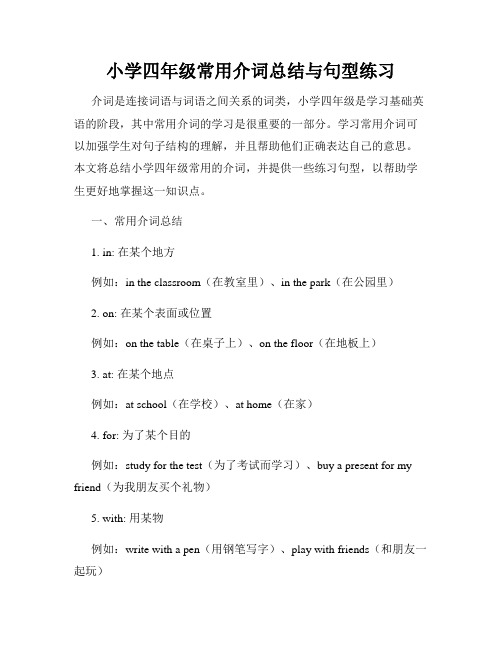
小学四年级常用介词总结与句型练习介词是连接词语与词语之间关系的词类,小学四年级是学习基础英语的阶段,其中常用介词的学习是很重要的一部分。
学习常用介词可以加强学生对句子结构的理解,并且帮助他们正确表达自己的意思。
本文将总结小学四年级常用的介词,并提供一些练习句型,以帮助学生更好地掌握这一知识点。
一、常用介词总结1. in: 在某个地方例如:in the classroom(在教室里)、in the park(在公园里)2. on: 在某个表面或位置例如:on the table(在桌子上)、on the floor(在地板上)3. at: 在某个地点例如:at school(在学校)、at home(在家)4. for: 为了某个目的例如:study for the test(为了考试而学习)、buy a present for my friend(为我朋友买个礼物)5. with: 用某物例如:write with a pen(用钢笔写字)、play with friends(和朋友一起玩)6. to: 去某个地方例如:go to school(去学校)、send a letter to my grandma(给我奶奶寄信)7. from: 来自某个地方例如:come from China(来自中国)、receive a gift from my teacher (从老师那里收到礼物)8. by: 通过某种方式或工具例如:travel by plane(乘飞机旅行)、write by hand(手写)二、句型练习1. 选择合适的介词填空:a) The book is _______ the table.b) I go to school _______ bus.c) The cat is hiding _______ the chair.d) My family is going on vacation _______ July.e) We play football _______ our friends every Saturday.2. 翻译下列句子:a) 我坐在椅子上。
- 1、下载文档前请自行甄别文档内容的完整性,平台不提供额外的编辑、内容补充、找答案等附加服务。
- 2、"仅部分预览"的文档,不可在线预览部分如存在完整性等问题,可反馈申请退款(可完整预览的文档不适用该条件!)。
- 3、如文档侵犯您的权益,请联系客服反馈,我们会尽快为您处理(人工客服工作时间:9:00-18:30)。
小学英语介词总结介词(Preposition)一、概述介词是英语中很活跃的词,一般置于名词之前。
它常和名词或名词性词语构成介词短语。
同一个介词常和不同的词语搭配形成固定搭配,表示不同意义。
二、常用介词的基本用法at①表示时间:I go to school at seven every day 我每天早上7点去上学。
②表示在某一具体地点:He is standing at the bus stop 他站在公共汽车站。
③表示动作的方向、目标:Let me have a look at the picture 让我看看这幅图。
④用于某些固定搭配:at once 立刻、马上at last 最后at the same time 同时at first 开始时not at all 一点也不about①表示大约时间:I's about six o'clock now. 现在大约6点钟了。
②表示地点;在……周围:Everthing about me is so beautiful 我周围的一切都那么美好。
③关于,对于:We are talking about the news. 我们正在谈论新闻。
after①在……之后:After dinner I watch TV. 晚饭后我看电视。
②在……后面:He came into the room after me. 他在我后面进了房间。
behind①在……之后:There is a bike behind the tree. 树后有一辆自行车②比……晚,迟于:The train is behind time. 火车晚点了by①在……旁:He is sitting by the bed. 他正坐在床边。
②到……时候:We have learned three English songs by now. 到现在为止,我们已经学会了三首英文歌曲。
③以……方式:I go to school by bus. 我乘公共汽车去上学。
④用于某些固定搭配:one by one 一个接一个by the way 顺便说一句for①为,给,替:I'll make a card for my teacher. 我要给老师做张卡片。
②由于:Thank you for helping me. 谢谢你帮我。
③表示给(某人)用的:There is letter for you. 这儿有你一封信。
in①在……里面:The pencil is in the desk. 铅笔在课桌里。
②在一段时间里:We have four classes in the morning. 我们上午有四节课。
③用,以:What's this in English? 这用英语怎么说?④在某一年份,季节,月份:in 2002, in spring, in January⑤表示状态,服饰:Helen is in yellow. 海伦身穿黄色衣服。
⑥在……方面:He is weak in English. 他的英语不行。
⑦用于某些固定搭配:in front of 在……前面in the end 最后in time 及时like①像……样:He looks like his father. 他像他的父亲。
②这样,那样:Don't look at me like that. 别那样看着我。
③怎样:What's the weather like? 天气怎样。
near靠近,在……附近:My bed is near the window. 我的床在窗户旁。
of①的(表示所属关系):This is a photo of my family. 这是一张我家的照片。
②……的(用于所有格):He is a friend of mine. 他是我的一个朋友。
③表示数量(与连词连用):One of us is from Beijing. 我们中有一个来自北京④想到,谈到:I often think of them. 我常常想到他们。
⑤用于某些固定搭配:of course 当然because of 因为,由于on①在……上面:There are some apple on the tree. 树上有些苹果。
②在(星期)天,在某天的上午(下午,晚上):They go to English class on Sunday. 星期天他们去上英语课。
I left Beijing on the morning of May 1. 我在5月1日早上离开北京。
③用于某些固定搭配:on duty 值日on time 准时over①在……正上方:There is a lamp over the table. 桌子上方有一盏灯。
②遍及,穿过:There is a bridge over the river. 有座桥横跨那条河。
③超过,不止:She is a little over 2. 她两岁多了。
to①到,往,向:He walks to the window. 他走向窗户。
②表示时间、数量,到……为止Please count from ten to thirty. 请从10数到30.③向,对,给:Happy New Year to you all. 大家新年好。
underWhat's under your desk? 你书桌底下是什么?with①和,写:Could you go home with me? 你能和我一起回家吗?②表示伴随状态,带有:Who's that girl with glasses? 那位戴眼睛的女孩是谁?三、介词的固定搭配1)介词和名词的连用2)动词和介词的连用at arrive at/in 到达at first 起初;开始get off 下车at last 最后help sb. With sth. 帮组某人做某事at school 在上课,在上学ask for 请求at the moment 此刻get up 起床at home 在家;无拘束laugh at 嘲笑at present 现在learn from 向……学习at work 上班,在工作look after 照顾at the same time 同时look for 寻找think for 想到on worry about 担心on duty 值日listen to 听on holiday 度假look at 看;注视on time 准时talk about 交谈;谈on the left/right 在左/右边wait for 等候;等on the radio 在广播中thank for 为……而感谢on foot 步行on sale 出售;降价出售3)形容词和介词连用on TV 在电视上播放be afraid of 害怕on the phone 在电话中be careful with 小心;关心on the way 在路上be interested in 对……感兴趣be good at 善于in be proud of 感到自豪in all 总体be crazy about 酷爱in class 在课堂上be late for 干某事迟到in English 用英语be good for 对……有利in short 总之4)其他in a hurry 匆忙地by+交通工具in the end 最后by bus/train/plane/air/ship/bike/sea/land…in bed 躺在床上lots of/a lot of 许多,大量in danger 在危险中at most 至多in fact 事实上at least 至少in time 及时地at once 立刻;马上in a minute 立刻in order to 为了介词练习A( )1.___ the afternoon of May, we visited the old man.A. OnB. AtC. In( )2.Many people work ___ the day and sleep ___ night.A. on ; atB. in ; inC. in ; at( )3.He speaks Japanese best ____ the boy students.A. betweenB. withC. among( )4.A wolf ___ a sheep skin is our dangerous enemy.A. withB. inC. on( )5.Joan hopes to come back ___ three days.A. afterB. forC. in( )6.They sent the letter to me ___ mistake.A. byB. forC. with( )7.He left home ___ a cold winter evening.A. atB. onC. in( )8.Shanghai is ____ the east of China.A. inB. onC. to( )9.____ my father’s help, I have finish ed my composition.A. UnderB. OnC. with( )10.He’s very strict ____ himself and he’s very strict ___ his work.A. with ; inB. in ; withC. with ; with( )11.I really can’t agree ____ you.A. toB. onC. with( )12.The shop won’t open ___ nine in the morning.A. untilB. atC. during( )13.How about ___ the flowers now?A. wateringB. are wateringC. watered( )14.She spent all his money ___ books.A. inB. withC. on( )15.They are talking ___ low voices.A. withB. inC. on( )16.It’s very kind ___ you to help us.A. forB. toC. of( )17.What will you have ___ breakfast this morning?A. withB. forC. by( )18.A plane is flying ____ the city.A. onB. overC. above( )19.You are free to speak ___ the meeting.A. atB. inC. on( )20.Mr. Green will stay in China___ Friday.A. toB. onC. till( )21.It’s wrong to play jokes ___ other people.A. onB. ofC. with( )22.Which color do you like? I prefer blue ___ red.A. forB. asC. to( )23.The student will give us a talk ___ how to use our spare time.A. forB. onC. in( )24.I paid two hundred yuan ___ that kind of bicycle.A. inB. forC. on( )25.The doctor is very kind ___ his patientsA. toB. onC. at( )26.We can’t live ___ air.A. inB. withC. without( )27.The child was afraid ___ the strange sound.A. atB. forC. of( )28.He was very angry ___ her for being late.A. forB. withC. at( )29.What do you think __ _ the play?A. aboutB. likeC. of( )30.I think it’s the right way to work out the problem, but I am notsure _____ it.A. doB. aboutC. of( )31.Reading ___ the sun isn’t good _ __ youA. under ; forB. in ; forC. in ; to( )32.I won’t ask about it, I’m going to see it ___ _ my own eyes.A. byB. forC. with( )33.We go to school every day _ ___ Sunday.A. exceptB. withoutC. on( )34.There is a small river ___ the two townsA. inB. betweenC. among( )35.Li Lei sometimes falls asleep ___ the lesson.A. forB. throughC. during( )36.Mr. Black went to Paris ___ a few days.A. forB. inC. after( )37.They will leave ________ London next month.A. toB. fromC. for( )38.Are you going to the zoo __ _ bus or ___ my car?A. on ; byB. by ; inC. on ; in( )39.He woke up several times _ __ the nightA. inB. atC. on( )40. We traveled overnight to Paris and arrived _______ 5 o’clock ______ the morning.A. on; inB. at; inC. at; onD. in; on( )41. Where’s Lily? We are all here _______ her.A. besideB. aboutC. exceptD. with( )42. She sent her friend a postcard _______ a birthday present.A. onB. asC. forD.( )43. Jack has studied Chinese in this school ______ the year of 2000.A. sinceB. inC. onD. by( )44. ---What is a writing brush, do you know?---It’s _______ writing and drawing.A. withB. toC. forD. by( )45. English is widely used ______ travellers and business people all over the world.A. toB. forC. asD. by( )46. _____ the help of my teacher, I caught up with the other students.A. UnderB. InC. WithD. On( )47. Hong Kong is ______ the south of China, and Macao is ______the west of Hong Kong.A. in; toB. to; toC. to; inD. in; in( )48. ---You’d better not go out now. It’s raining.---It doesn’t matter. My new coat can keep ______ rain.A. inB. ofC. withD. off( )49.There are many apples ___ the tree. A bird ___ the tree is picking an apple.A. in ; onB. on ; inC. in ; at( )50. “Who are you going to play ____?” “Grade Two.”A. aboutB. byC. againstB一、选用括号内恰当的介词填空。
